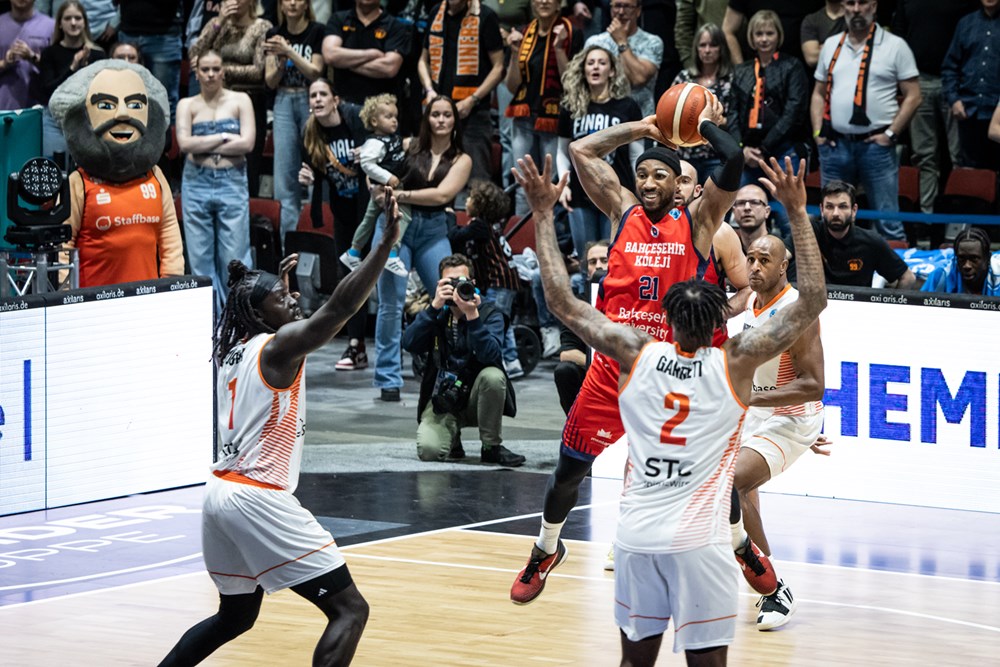
It’s the other competition in European basketball. For most, it’s an afterthought. In the eyes of this website, it’s a gem that speaks to the soul to the sport. Emmet Ryan on the need to keep the FIBA Europe Cup in the future of basketball
During arguably the busiest week of the European basketball year, its least discussed competition reached its conclusion. Niners Chemnitz claimed the FIBA Europe Cup title amidst Euroleague playoffs, the Basketball Champions League Final Four, and lots of players from this continent playing in the NBA playoffs. Yet for all of its seeming irrelevance, this competition brings a joy that deserves protection.
Peace is a good thing
The longtime civil war between FIBA and Euroleague seems to finally have moved from the stage of ceasefire to cooperation. Patrick Comninos, the CEO of the Basketball Champions League (BCL), effectively said what everyone has been thinking for a few months. The road to a merger between FIBA’s BCL and Eurocup, the latter run by Euroleague, appears to be clearing.
It makes sense as the interests of the clubs involved are reasonably well aligned. They want a substantial but manageable continental schedule. These clubs also want a route to the Euroleague for all. Peace and cooperation should also lead to more sense overall calendar.
A merged competition would likely means the BCL Final Four wasn’t taking place in the meat of the Euroleague playoffs. At the very least, its semi-finals would have clashed directly with Euroleague’s playoffs. Sensible thought would have won out. We’ve already seen improvements, with room made for all players based in Europe including Euroleague to play in the international windows.
The one concern with such a peace deal is simple. Where does it leave the FIBA Europe Cup?
Succeeding where UEFA failed
Basketball in Europe hasn’t quite reached the levels of financial disparity of football yet. The gaps between the haves and have-nots are widening all the same. The Europa Conference League was meant to give more room for success for the have-nots in football.
The memo seems to have been lost as Roma and West Ham, hardly paupers, took the first two titles. Aston Villa look favourites to claim the crown this year. While neither Villa nor the Hammers regularly win trophies in England, they are amongst the richest clubs in the sport purely by virtue of being in the English Premier League.
Contrast that with the FIBA Europe Cup. In its eight completed seasons, it’s had eight different champions from six different countries. Of those eight teams, it was the first pan-European honour for seven of them and the first top level honour of any type for three of them. You can add in semi final appearances by sides from Belgium, Denmark, Estonia, Finland, and Netherlands, none of whom are powerhouses in the club game. This competition hits different.
BallinEurope is ramping up its YouTube game this season. Subscribe to our channel now for player exclusives, analysis videos, and much more.
Let it live
The natural concern with the consolidation of matters between FIBA and Euroleague is what happens to the bottom rung. The FIBA Europe Cup is the unquestioned fourth competition of four in pan-continental basketball.
What it lacks in star power it makes up for in stories. The rise of Niners Chemnitz this season, where they are only a half game out on top spot of the Bundesliga, wouldn’t have been as noticed without the FIBA Europe Cup run. The joy of Anwil last season in their title run was clear. Every FIBA Europe Cup run, even the semi final charges of a Kalev-Cramo or Bakken Bears, brings with it magic.

Honestly I was looking for any chance to include the Karl Marx mascot of Niners Chemnitz in this piece so here he is at the first leg of the FIBA Europe Cup final.
These may not be the best teams on the continent but they are peers. In that they get to experience the wide variety of styles and fandom that come throughout Europe. Heaven knows, that’s something I try to experience at every opportunity. The FIBA Europe Cup is as much a cultural exchange through the language of basketball as it is a competition.
With no immediate reward beyond it on the table for the champion, there’s a purity to it that is special. The elevation is one of spirit. As all sport grows more homogeneously focused purely on commercialisation, a space for such expression in basketball is vital.
BallinEurope has a book, a real life actual book called I Like it Loud, and you can buy it on Amazon now. It’s here as a book and here in Kindle form.
Should we be worried
No plans for the future or lack thereof for the FIBA Europe Cup have been intimated let alone announced. The threat is not imagined, it’s just the logical next step in the process. The purpose of the FIBA Europe Cup, especially in the event of a Eurocup/BCL merger, won’t be clear.
Here’s the thing, that lack of clarity already exists yet has also already been resolved. Save for its maiden season, when it replaced Eurochallenge, there was no obvious role for the competition. Once the BCL arrived, the role of the FIBA Europe Cup was just to give FIBA a second competition. In the event of peace and cooperation, which really are good things, that necessity ceases to be.
Yet a new necessity has grown out of it. The competition has become its own beast in spite of itself. One where doubt reigns regularly throughout the campaign. There’s no sense of inevitability that certain clubs will always be there come the end. When the story begins each autumn, we can’t predict the next page let alone the next chapter. That’s worth more that protecting. It’s something to nourish and cherish.




Leave a Reply